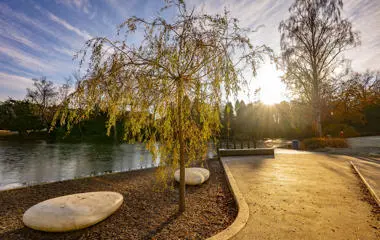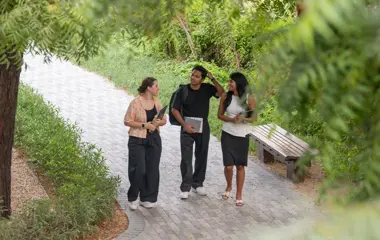Key information
- Funding
- Self-funded
- School
- Energy, Geoscience, Infrastructure and Society
- Location
- Edinburgh
- Award
- PhD
- Delivery type
- Full-time, Part-time
- Start date
- September
The Intergovernmental Panel on Climate Change agreed some two decades ago that the world is warming up and that this effect was human-induced through our dependence on fossil fuels and their impact on greenhouse gas (GHG) emissions. The biggest contributor to GHG emissions is the built environment, accounting for up to 50% of global carbon dioxide emissions. The current UK infrastructure, technologies and lifestyle were developed for a high carbon economy; to achieve an 80% emissions cut at an acceptable cost, all of this infrastructure will have to be significantly adapted.
There is no single solution to the climate change dilemma. A complex combination of new technologies, improved systems and changed behaviours, together with realistic expectations for a lower carbon economy is required. Historical advances in technology (cars, PCs, mobile phones) were easily accommodated due to the immediate benefit derived from their use. Actively making decisions to reduce energy consumption is more difficult because the benefit is futuristic and less easily measured in practical terms. The cost manifests itself in potentially unpopular lifestyle changes. Despite this, the World Commission on Environment and Development remains convinced that it is possible to build a future that is prosperous, just, and secure. This possibility relies on international cooperation, and an adoption of sustainable development objectives as a priority.
Researchers within this theme take a holistic view of the building process from early design concept and construction right through to occupancy, maintenance and eventual demolition. This unique approach helps to foster a greater collaboration between all of the teams involved e.g. the architects, investors, contractors, engineers etc, as well as evaluating the carbon impact and sustainability of the whole life cycle. Members of the group have active research interests which aim to ensure that buildings are fit for purpose, meet all government standards for carbon reduction, reduce costs, and provide a healthy environment for their users.
Entry requirements
Candidate criteria
We welcome applications from suitably qualified candidates. Please visit our How to apply page.
Funding information
| Status | Full Time | Part Time |
|---|---|---|
| Scotland | £5,151 | £2,575.50 |
| England / Wales / N Ireland | £5,151 | £2,575.50 |
| International | £20,456 | £10,228 |
- Status: Your residency status is usually defined as the country where you have been ordinarily resident for the three years before the start of your course.
- International: 'International' includes applicants from European Union countries who do not hold Pre-Settled or Settled status in UK. (This does not include students from the Republic of Ireland - see above).
We offer a number of competitive funded scholarships for research degrees. Full or partial support may be available for well-qualified candidates from UK research councils, research pools, charities or industry.
View our full range of scholarships.
Why Heriot-Watt
We're the top university in Scotland for graduate outcomes which means that more of our graduates are employed or in postgraduate education than any other institution in the country and we ranked 5th in the UK.
We're also rated number one in the UK for CEO or MD roles, meaning more of our graduates go on to become CEOs or MDs than any other university in the whole of the UK. On top of that, we have beautiful campuses, across the globe, so you'll get a truly international education. Our Edinburgh Campus is home to Oriam, Scotland's National Sports Performance Centre combined with plenty of wellbeing resources, prioritising fitness and mental health for all students. Our Global Research Institutes look at solving real world issues such as climate change and saving our oceans as well as working on the next medical technological breakthrough and the future of AI and robots.




